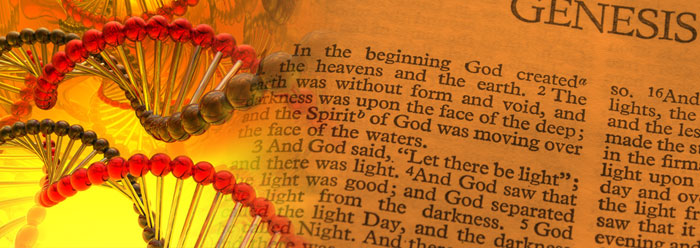It has now been almost 50 years since a committee of evangelical geologists rebuked me about a paper I had just presented at the 1953 convention of the American Scientific Affiliation. The paper was entitled, "Biblical Evidence for Recent Creation and a Worldwide Deluge." These men were all graduates of a prominent Christian college, yet took strong exception to my premise that the Bible should govern our interpretation of the geological data, arguing that my position would prove an embarrassment to the Christian community.
Several years later another geologist, then teaching at the same Christian college, spent the summer at Virginia Tech (where I was a department head at the time) and attended the college Sunday school class I was teaching. He also insisted that science should govern our Biblical interpretations, not the other way around. All these men insisted that we could and should stretch the meaning of any Scripture as far as necessary to make it conform to the current majority view of scientists.
That approach, of course, is how earlier compromising religious scientists had arrived at such concepts as theistic evolution, the gap theory, progressive creation, the local flood, and other such adjustments. They assumed that the evidence for an ancient earth was so strong that the plain record of the Bible (six-day creation, the global flood, etc.) simply had to be reinterpreted to accommodate it. This approach soon led to full-blown theological liberalism and worse.
At ICR we believe the Bible to be the verbally inspired, fully inerrant Word of God, completely true in science and history as well as in matters of ethics and spirituality. Furthermore, we are confident that God is able to say exactly what He means, so His Word should be taken literally unless the context clearly indicates a metaphorical meaning is intended. This is what the Bible itself teaches concerning itself.
The classic summary text, of course, is II Timothy 3:16 in which Paul reminds us that: "All scripture [not just those parts dealing with religious matters, and not just the `thoughts' but the actual words written, for that is the very meaning of the word `Scripture'] is given by inspiration of God [literally `God-breathed,' not the product of human reasoning]."
This great truth is not based on just one passage, for this is taught throughout the Bible. The Lord Jesus said, for example, that "the scripture cannot be broken" (John 10:35). That this principle applies to every word was also confirmed by Him. "For verily I say unto you, Till heaven and earth pass, one jot or one tittle shall in no wise pass from the law, till all be fulfilled" (Matthew 5:18).
The same high view of God's words is also found frequently in the Old Testament. Among others, practically every verse of the longest chapter in the Bible (Psalm 119) extols some virtue of the Scriptures. For example, there is the testimony of Psalm 119:160. "Thy word is true from the beginning: and every one of thy righteous judgments endureth for ever."
And then consider the sobering truth that the Bible closes with a warning from Christ not to tamper with its words. "For I testify unto every man that heareth the words of the prophecy of this book, [note well, `the words']. If any man shall add unto these things, God shall add unto him the plagues that are written in this book: And if any man shall take away from the words of the book of this prophecy [again note, `the words of the book'], God shall take away his part out of the book of life" (Revelation 22:18-9). It is, thus, presumptuous and dangerous for any self-styled modern "prophet" to allege that he has received some new revelation from God, or for any self-appointed modern critic to presume to reject the plain truth of Scripture in favor of some ad hoc reinterpretation based on current scientific theory.
Practically all Christian young-earth creationists would agree with the above. They often cite II Peter 3:3-6 as precisely relevant to this issue. There the apostle warns against the uniformitarian approach to the study of earth history. Scoffers of the last time, Peter predicted, would insist that "all things continue as they were from the beginning of the creation" (thus presuming that naturalism and uniformitarianism govern all scientific laws and processes), thereby willfully ignoring the divinely revealed facts of the special creation of all things in the beginning and then the global interruption of all processes by the great flood 1656 years later. If what Peter says is true, then the uniformist approach to the study of earth history can only be valid back to the time of that worldwide flood at the most.
Although most Bible literalists will agree with that principle in general, we sometimes tend to forget it in practice. For example, the concept of entropy (the second law of thermodynamics) provides a powerful argument against vertical evolution, stating the universally observed fact that all systems tend to disintegrate with time. It seems to correlate perfectly with the implied effects of God's great Curse on Adam's dominion following his sin of disobeying God's Word. Yet there is a temptation to question this correlation because of the assumption that most natural processes must have been operating in accordance with the second law even before sin and the Curse.
But that is uniformitarian reasoning! The Genesis record specifically says that processes before the Fall and Curse were different from those after (note Genesis 1:31, 2:3 and 3:17-18). We need to remember that we cannot legitimately discuss events and processes in the period between Creation and the Curse in terms of present processes.
This particular question might be resolved by assuming that, before the Curse, entropy was conserved just as energy is conserved, but that it began to increase with the Curse. The second law was thus operative before that, but in a slightly different form. As far as the first law is concerned (the principle of energy conservation), that principle seems to have been operating ever since the end of the creation period. Christ, the Creator is now "upholding all things by the word of His power" (Hebrews 1:3).
On the other hand, to assume that the decay aspects of the entropy law were operating before the Curse seems to be a tacit admission (perhaps unintentional) that death was also operating before the Fall, and this clearly contradicts Scripture (e.g., Romans 5:12; I Corinthians 15:21). The Bible—not scientism—should govern our interpretation of any such problems.
The question of the firmament (Genesis 1:6) has also generated various interpretations, but we need to keep in mind that the Hebrew word (raqia) means simply "expanse," as in "a great expanse of water between California and Hawaii." An essentially synonymous English term would be "space." And just as "space" can be used to refer to space either as an entity or to a particular space, so likewise for the word "firmament."
There are at least two—probably three—special "firmaments" mentioned in Scripture. The most exalted firmament is under God's throne (Ezekiel 1:26). Also, there is an atmospheric firmament, where birds fly, and a stellar firmament, where the stars are (Genesis 1:20,14). There are likewise three "heavens" (note II Corinthians 12:2), and it is significant that God called the firmament "Heaven" (Genesis 1:8), where the Hebrew for "heaven" is actually a plural noun (shamayim), frequently translated "heavens." These distinctions are not often made by creationists when discussing a particular firmament (or space, or heaven), but they are Biblical, and it is important to take careful note of the context in each case.
This brings up another controversial subject, the canopy theory, the essential component of which is "the waters which were above the firmament" (Genesis 1:7). If the particular firmament (or space, or heaven) in mind here is the atmosphere, and if the waters were in the vapor state, then many Biblical facts and scientific relationships are beautifully explained. However, there are certain scientific difficulties that are still unresolved, and there is again a temptation to abandon the theory because of these.
Although the Bible does not specifically teach the canopy theory in so many words, there are several mysteries at least partially explained by it (the source of the waters for the 40-day rain producing the global flood, the longevity of the ante-diluvians, the lack of any rain before the Flood, the diurnal mist that watered the antediluvian lands, the origin of the rainbow, the greater size of most animal orders before the Flood, and others), that it can at least be offered as a good possibility. The scientific challenges are not insuperable. This is especially true in light of the fact that so many hitherto scientific "givens" are currently being vigorously reconsidered—even such supposedly basic constants as the velocity of light and acceleration of gravity. The factors affecting the atmosphere are many and complex, and the canopy theory has not yet been proved impossible, and should not be dismissed.
A similar argument could be made about other difficulties that sometimes tempt us to adapt uniformitarian thinking in dealing with them. But the Bible exhorts us to let God say what He says, including the revealed fact that processes before the Flood—and especially before the completed Creation—were not the same as they are now.
What is wrong with simply believing what God has revealed in His Word, even when we don't yet have a scientific explanation for a particular problem? As the apostle Paul would say: "What if some did not believe? shall their unbelief make the faith of God without effect? God forbid: yea, let God be true, but every man a liar . . ." (Romans 3:3-4).






















